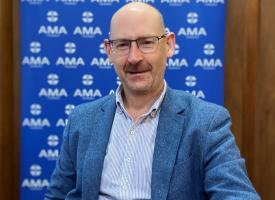Dr Bartone - RN Drive - Health care in the Federal election campaign
Transcript: AMA President, Dr Tony Bartone, Radio National, RN Drive with Patricia Karvelas, Wednesday 1 May 2019
Subject: Panel discussion on health care in the Federal election campaign
PATRICIA KARVELAS: For Australians concerned about health care, it can be difficult to avoid the spin and figure out what are the policies being offered. So, we've assembled a panel: Dr Tony Bartone is the President of the Australian Medical Association; Jane Hall is a Distinguished Professor of Health Economics at UTS in Sydney; and Darren Saunders is a cancer biologist and Professor of Medicine at UNSW. They're all joining me to cut through the spin and just look at the policy agendas.
Welcome to the three of you.
TONY BARTONE: Good evening.
DARREN SAUNDERS: Hi, Patricia.
JANE HALL: Thanks, Patricia.
PATRICIA KARVELAS: Tony, health care has been a centrepiece of Labor's election campaign. Are you broadly satisfied with the spotlight so firmly on this area as we head to election day, and what do you make of the competing policies?
TONY BARTONE: Look, it was very encouraging to see that right from the get-go, health took front and centre stage, you might say, both in the number and in the size of the announcements - initially in the Budget and then the post-Budget reply. And then, once the bells were rung and we went into the election process proper, we still got more and more announcements in that respect. Yes, it was very encouraging to see that the focus on what a lot of Australians really do put as a number one or two issue for them as they come into this election period.
Australians have a deep love affair with Medicare and a deep love affair with their hospital system, and they want assurance and certainty behind both the policy [and] the funding envelope that will see that maintained well into the future. We all are aware of an increasing population, an increasing ageing population, and, of course, an increasing complexity of chronic disease and morbidity that comes with that. And having to deal with those challenges in a restrained Budget envelope has been the focus or the feature for the last number of years, the last three or four years in particular.
We had the announcement of our Public Hospital Report Card, which clearly demonstrated that from a public hospital perspective, an outcome point of view, that things are getting- either they've remained stationary or getting worse in all States in Australia and Territories, and that we really are struggling there.
I suppose you could say that when public hospitals are not doing well, that's a marker for the whole health system as a whole in terms of the prognosis, you might say, for the future. If it's struggling and we're not doing enough about prevention, we're not doing enough about coordinated care and primary care in terms of keeping Australians in better shape, in preventing them needing to access secondary and tertiary care down the track, well, you can see why if public hospitals are doing poorly, we're in a difficult situation.
So yes, coming back to your question - happy to see the focus on health, but there are still many gaps ahead, and that's what we'll come to in a moment, no doubt.
PATRICIA KARVELAS: Darren, we've seen a major announcement around cancer care from Labor. How significant are out-of-pocket costs for cancer patients, and how far will this go to actually dealing with that?
DARREN SAUNDERS: The first part of the question, in terms of significant, I think it's a very significant cost for most cancer patients. And it's not just the cost of care, it's also the cost of lost income and cost of all of the associated trauma that goes along with treatment for cancer. You know, I think politically it's quite a clever policy because of the fact that one-in-two to one-in-three people are affected by cancer in some way in their lifetime, so all of us are either directly or very closely affected by cancer. So, from that perspective, it really will resonate with a lot of people.
As to how effective the policy will be in relieving out-of-pocket costs, I think there are some aspects of it - the funding of extra scans that both parties have talked about I think will make a big difference, both in terms of access and cost. The issue around the rebate for the new Medicare provider number around oncology services - I think there's a big question over how much of that will go to patients and how much of it will go to the providers. It's nice to see a little bit of a nod to cancer research, although it's a relatively small drop in a very big bucket.
So yeah, I think there's some good bits and some more sort of worrying aspects to it.
PATRICIA KARVELAS: Jane, the Coalition has made various economic arguments against some of these health policies that Labor has proposed. For example, they argue that the cancer care policy has a $6 billion black hole with it. There was confusion about whether there would be multiple bulk billing items for cancer patients or just one, although we had Catherine King on this week and she said one. Do we need to know more about how these kinds of changes will be costed, funded, and ultimately applied?
JANE HALL: Ultimately, we do. I think what's been clever about the bulk billing incentive for cancer consultations is that it comes as a separate item. And so it's really a safeguard against it just flowing through into higher fees, because a specialist will not be able to get that extra payment unless they've agreed to bulk bill for the services that that applies to. I think the - if I may go on from that, Patricia - the real challenge that we're seeing with all of these promises is that our challenge in the Australian healthcare system is not just to get more services, but to make sure we get more valuable services, more value for the money we spend on healthcare.
PATRICIA KARVELAS: Tony, if I can come back to you - in your view, are these the areas that need the most urgent attention in terms of reform in Australia's healthcare system, the areas that have been identified now?
TONY BARTONE: There's no doubt that the areas that have been identified have been in need. But if we look at what hasn't been spoken about in the large context in this campaign so far - and I come to the areas such as aged care and the broader mental health strategies, as well as the importance of ensuring that there is a release valve for the public hospital system that, if the private health system, which if it was to fail in the short term, would put an enormous burden on the public health system and the ability to keep up to speed, you might say, with the ability to meet ED demands, to meet elective surgery timetables, which we know are blowing out and becoming more and more short of the targets which were set back in 2014 by all the State and Territory health ministers at the time through COAG.
So yes, the areas are very much in need, but we need - and I've said this time and time again - we need an overarching, comprehensive, whole-of-health policy that looks not just at the short term, but looks at what do our community and our patients need into the future. We need prevention as much as primary care being the drivers, being the mainstay, being the foundations of better connected and interrelated care, and ensuring that we relieve some of the drivers, some of the demands on our secondary health, our hospital system, and the complications that ensue from that.
We've got to get smarter. We've got to do our work in a better coordinated manner and spend those dollars, as Jane was saying, much more effectively and much more efficiently and wisely in an ageing population, in a population that's going to have to come to grips with increasing complex and chronic disease.
PATRICIA KARVELAS: Darren, your area of expertise is cancer research. We heard from Labor that there would be a specific investment in cancer research of $125 million; I understand the Liberal Party's also made commitments around research there. What do you make of the competing policies around research?
DARREN SAUNDERS: Look, I think in some ways research has kind of fallen off the political agenda after it really- it tanked in the last election, really; didn't get a lot of support more broadly from voters. And so we're not really seeing a lot of discussion around research policy in cancer or even more broadly.
PATRICIA KARVELAS: [Interrupts] What do you mean it tanked in terms of voters?
DARREN SAUNDERS: I think a lot of people- you know, it was kind of wrapped up in the innovation agenda and the ideas boom kind of notion, which a lot of people interpreted as “robots are going to take our jobs”. And so unfortunately that notion of incorporating innovation into policy, health policy and more broadly, has kind of, you know, really taken a bit of a backburner in this election. I think that's understandable from a political perspective.
I think- you know, we've seen a huge investment of the Medical Research Future Fund. I think most scientists, most researchers would like to see a lot more transparency around how that money is dished out, around how the priorities are decided and who gets that money; that's a really big issue at the moment. There's no doubt that will have a big impact. You know, the money we spend on research now will feed in to better health outcomes down the track, but of course that takes a long time.
I think the other issue here, that it's hard to separate health policy from things like climate change policy. You know, the estimates are something like another quarter of a million deaths per year within our lifetime from climate change and I think, you know, we need to be sort of thinking about how things like climate change, things like Indigenous policy and equity also plays into health policy, both in cancer and more broadly.
PATRICIA KARVELAS: Just on another specific policy that I think has got a lot of attention - Jane, to you - and that's the dental plan, because under Labor's plan, approximately 2.6 million pensioners will have access to a pension dental plan that gives them, I think, access to $1000 every two years. Is that a step towards a universal dental care plan and is that welcome?
JANE HALL: I hope it's a step towards a universal dental health care plan, and it's certainly welcome. What we know is that poor dental health is a major issue not just in itself, but as part of people's overall health, and overall ability to have social structures around them such as work, their ability to socialise with people. Poor dental health affects nutrition; it affects health; it affects life opportunities. And, in many ways, we're a funny country that we left dental health out of Medicare. I can see why, because at the time there was a lot to do, bringing the health system together into the Medicare framework. But I think it certainly is time to do more about dental health for all ages. But I think with any of these programs, we often have to start in a slower way. Unless the system is really well geared up with spare capacity, you just can't introduce broad-scale changes overnight.
PATRICIA KARVELAS: What do you make of that argument, Tony Bartone? Do you think that ultimately dental should be included?
TONY BARTONE: There's no doubt that good oral health is the basis for good holistic patient health. When we're not able to ensure that those who are needing dental care are able to access that dental care, there needs to be a solution that looks at facilitating that. Whether that's part of an overall, a more universal package, I'll let wiser people, perhaps, contribute to that argument in detail, but there's no doubt in my mind that the importance of oral health, good oral health underpins good overall health.
PATRICIA KARVELAS: And just finally - because we've run out, a bit, of time, to be honest, but I just think this is worth dealing with as well - with you, Jane, we've heard many times in this election campaign from Scott Morrison that under the Coalition Government we've seen record investment in hospitals and funding. Is that accurate? Because Labor obviously has gone hard against the Coalition on this issue, but who's right?
JANE HALL: They're both right.
PATRICIA KARVELAS: [Laughs] Oh, the old “they're both right”.
JANE HALL: Let me explain it, let me explain it.
PATRICIA KARVELAS: Of course I will.
JANE HALL: Because the population is growing, because health care gets more and more complex, the money that the Government has put into health care in simple dollar terms has definitely increased. However, it has not increased at the same rate as it would have under the Labor National Health Reform Agreement of 2011 and on. There were substantial cuts in 2014 in the Liberal Government Budget, and there've been other cuts to what was the original agreement of the National Health Reform. So, what we've seen is yes, in simple dollar terms, spending has gone up. In terms of what had been previously projected, the Liberal Government has spent a lot less than a Labor Government had promised to spend.
PATRICIA KARVELAS: I want to thank the three of you - we've run out of time, but it's been a great conversation. Really appreciate your time tonight.
JANE HALL: A pleasure.
TONY BARTONE: Thanks very much.
DARREN SAUNDERS: Thanks, Patricia.
PATRICIA KARVELAS: Dr Tony Bartone is the President of the Australian Medical Association. You also heard there from Jane Hall, a Distinguished Professor of Health Economics at UTS in Sydney; and Darren Saunders is a cancer biologist and a Professor of Medicine at UNSW. And this is RN Drive.
2 May 2019
CONTACT: John Flannery 02 6270 5477 / 0419 494 761
Maria Hawthorne 02 6270 5478 / 0427 209 753
Follow the AMA Media on Twitter: http://twitter.com/ama_media
Follow the AMA President on Twitter: http://twitter.com/amapresident
Follow Australian Medicine on Twitter: https://twitter.com/amaausmed
Like the AMA on Facebook https://www.facebook.com/AustralianMedicalAssociation



